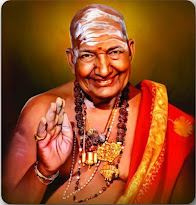Excerpts from talks on Bhagavad Gita CH15 by Pujya Guruji - Day 4
 |
| Pujya Gurudev & Guruji |
In verses 3 & 4, Krishna urges us - With Vivek and Vairagaya cut down the tree of samsara. These are like the two wings of a seeker to soar high in meditation on Truth and reach the destination, our own true Self.
Verse 5 enumerates qualifications of a seeker needed to attain the goal. Verse 6 talks about the goal, destination. One with purity of mind and clarity of thought reach avyaya Padam. What is it? Where the luminaries, Sun, Moon and Fire cannot illumine and reaching which there is no returning to samsara.
Pure Consciousness is my true nature, urdvam mulam. Shuddha Chaitanya is reflected in mind empowering/activating it, which in turn is reflected in body enlivening it. Reflected Consciousness (& of course Pure Consciousness) plus the mind plus the body is what I call as I, the jiva. Knower of this Consciousness as one’s own Self doesn't come back to samsara.
Many Devatas had assembled to witness the departure of Shri Krishna from this world expecting to see Lord amount Garuda and take off to His abode, Vaikunta. But Shri Krishna just sat with his eyes closed and merged within His true abode, His own Self. External luminaries, the Sun, Moon and fire cannot know or illumine our true nature that is Chit Svaroop.
Sun is the presiding deity of eye, organ of sight. Moon is the deity of mind and fire of speech. Subtler meaning is that neither organs of senses or action nor mind can know the very enlivening power behind these instruments.
Who gives light to the Sun and Moon in our dream? It is the pure awareness within and I am that. Knowing thus the enlightened jivas reach Lord and never return as they were never separate from their nature. This is pointed in verse 7 first and second pada.
All jivas are part (amsha) of the Lord. Here, amsha does not mean a piece, like a piece of bread. For, if it were Lord would have vanished into many pieces (jivas). But here it refers to a part as though, just as the reflections of Moon in buckets of water are amshas of Moon. As many upadhis (condictionings) as many jivas. Once water is thrown out reflection becomes one with the Moon as it was never separate or different from the Moon.
Reflect!!! When the mirror is removed my reflection merges in me, it was never separate from me. I can remain without reflection or shadow as I am without them anyway.
For other jivas, punarapi jananam punari maranam, punarapi janani jatare shayanam. And mother's womb can be even buffalo, giraffe, etc. The second half of verse 7 and also verse 8 and 9 explain such ignorant jiva’s gathi.
Jiva is the Ishvara (Lord) in body, the master of the body. When he leaves his residence, this body, he pulls the sense faculties from their golakas/apertures. His departure is so subtle that how exactly he leaves is not known. Like the gentle breeze carrying away the fragrance in a flower. And then attaining the next body he unpacks his faculties and starts enjoying the objects. This is much like a traveller packing up his suitcase upon departure from one station and unpacking it upon arrival at the next.
The theory of rebirth can be validated through Shruti, yukti and anubhooti. Vedas are the valid means for such matters beyond our perception. Katopanishad and many others talk of punarjanma and jiva gathi.
The worldly experiences are also in support of this theory. Jagat vaichitriyam, child prodigies, near death experiences of some, remembering past lives by some, etc. are some of them. Science too says that Matter and energy can neither be created not destroyed. We will see how rebirth can be logically proved in the next class.


Comments
Post a Comment